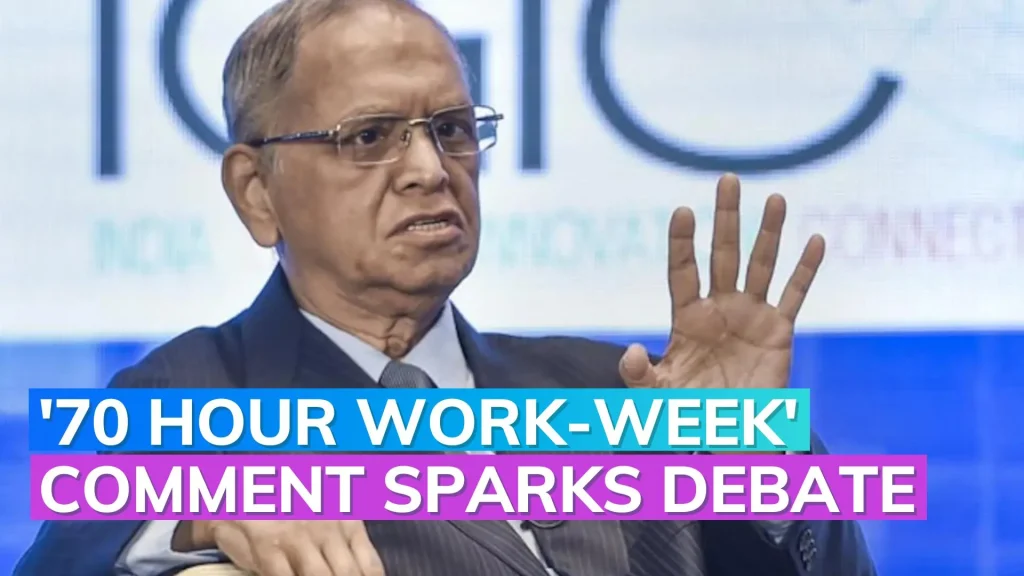In a significant shift, Infosys, India’s second-largest IT services company, has launched an internal campaign to promote work-life balance, urging employees to adhere to a standard 9.15-hour workday, five days a week, even during remote work.
This move, reported on July 1, 2025, by sources like News18, Hindustan Times, and NDTV Profit, contrasts sharply with co-founder Narayana Murthy’s 2023 advocacy for a 70-hour workweek to boost national productivity.
The policy, implemented post a hybrid work model introduced in November 2023, reflects growing concerns about employee health and burnout in the IT sector.
Infosys’s New Work-Life Balance Policy
Infosys’s latest initiative focuses on employee well-being by discouraging overtime, particularly during work-from-home (WFH) arrangements.
The company’s HR department monitors work hours monthly, sending personalized emails to employees exceeding the recommended 9.15-hour daily limit.
These emails include detailed reports on total hours worked, WFH days, and average daily hours, urging staff to take breaks, delegate tasks, and disconnect after work hours to recharge.
The policy aligns with Infosys’s hybrid work model, effective since November 2023, which mandates employees to work from the office at least 10 days a month.
The initiative addresses health risks associated with overwork, such as stress, irregular sleep, and heart-related issues, which have become prevalent among young professionals in India’s high-pressure IT industry.
| Policy Aspect | Details |
|---|---|
| Work Hours | 9.15 hours/day, 5 days/week (45.75 hours/week) |
| Monitoring | HR tracks remote work hours monthly |
| Communication | Personalized emails flag overtime, suggest breaks and delegation |
| Hybrid Model | Minimum 10 office days/month since Nov 2023 |
| Objective | Enhance employee health, reduce burnout, ensure long-term productivity |
This table summarizes the key elements of Infosys’s policy, providing an interactive snapshot for readers to grasp the initiative’s scope.
Narayana Murthy’s 70-Hour Workweek Advocacy
In 2023, Narayana Murthy sparked a nationwide debate by advocating for a 70-hour workweek, arguing that India’s youth must work harder to compete globally and uplift the nation’s economy.
Speaking at the Indian Chamber of Commerce’s centenary celebration in Kolkata, he emphasized relentless effort, stating, “I don’t believe in this concept of work-life balance.”
He reiterated this in a 3one4 Capital video series, suggesting young professionals work 70 hours weekly to drive India’s growth.
Murthy’s remarks drew mixed reactions. Supporters viewed it as a call for dedication to national progress, citing India’s need to match the work ethic of developed economies.
Critics, however, highlighted the risks of burnout, mental health issues, and reduced quality of life, especially in the context of modern workplace dynamics.
The backlash was evident on X, with users like @ShivaniV2901 questioning the sustainability of such demands.
Infosys’s Shift: Why the Change?
Infosys’s new policy appears to respond to both internal employee feedback and broader industry trends.
The IT sector has faced scrutiny for high-pressure work environments, with reports of health issues like heart ailments and stress-related disorders among young professionals.
The company’s focus on a 9.15-hour workday reflects a strategic pivot toward sustainable productivity, prioritizing employee health as a driver of long-term performance.
The timing is notable, following the adoption of the hybrid work model in November 2023. By monitoring remote work hours, Infosys aims to prevent employees from overextending themselves, a common issue in WFH setups where boundaries between work and personal life blur.
The policy also aligns with global corporate wellness trends, where companies like Google and Microsoft emphasize mental health and work-life balance to retain talent.
| Comparison | Murthy’s View | Infosys Policy |
|---|---|---|
| Work Hours | 70 hours/week | 45.75 hours/week (9.15 hours/day, 5 days) |
| Philosophy | Prioritize national productivity | Prioritize employee health and sustainability |
| Overtime | Encouraged for growth | Discouraged, flagged via HR emails |
| Work-Life Balance | Dismissed as a myth | Emphasized for well-being |
This table contrasts Murthy’s advocacy with Infosys’s policy, offering an interactive comparison for readers to understand the ideological shift.
Impact on Employees and Industry
For Infosys’s 323,000+ employees, the policy offers relief from the pressure of extended hours, fostering a healthier work environment.
Employees are encouraged to communicate with managers about workload, delegate tasks, and maintain clear work-life boundaries. This could enhance job satisfaction and retention, critical in an industry with high attrition rates.
The initiative also sets a precedent in India’s IT sector, where long hours have been normalized. Competitors like TCS and Wipro may face pressure to adopt similar policies, especially as employee well-being becomes a key differentiator in talent acquisition.
Posts on X, such as those from @livemint and @ThePuneMirror, reflect positive sentiment, with users praising Infosys’s focus on corporate wellness.
However, challenges remain. Some employees may resist the policy, fearing reduced output or career stagnation, especially in a culture where overwork is often equated with dedication.
Additionally, monitoring work hours raises privacy concerns, though Infosys’s automated email system appears non-intrusive.
In Short
For those short on time, here’s a concise overview of Infosys’s work-life balance initiative:
- Policy: Infosys urges employees to stick to 9.15 hours/day, five days/week, discouraging overtime, especially during WFH.
- Implementation: HR monitors remote work hours, sending personalized emails to flag excessive hours and suggest breaks.
- Contrast with Murthy: Unlike Narayana Murthy’s 70-hour workweek pitch in 2023, the policy prioritizes health and sustainability.
- Context: Introduced post-hybrid work model (Nov 2023), mandating 10 office days/month.
- Impact: Aims to reduce burnout, improve retention, and set a new standard in the IT industry.
- Sentiment: Positive feedback on X, with users like @htTweets noting the shift as progressive.
- Action: Employees should review HR emails, discuss workloads with managers, and prioritize well-being.
This summary captures the essentials, ensuring readers grasp the key points quickly.
Expert and Public Reactions
Experts view Infosys’s policy as a pragmatic response to modern workplace challenges. Dr. Anjali Gupta, a workplace wellness consultant, notes, “Overwork leads to diminishing returns.
Infosys’s focus on a 9.15-hour cap aligns with global studies showing optimal productivity within 40–50 hours weekly.” Industry analysts suggest the policy could enhance Infosys’s employer brand, attracting talent in a competitive market.
Public reactions, especially on X, highlight a divide. While @TimesNow and @business_today praised the initiative, some users referenced Murthy’s stance, with @MeghUpdates citing his defense of hard work as a cultural value.
Others, like @ShivaniV2901, criticized the disconnect between Murthy’s views and Infosys’s actions, especially amid reports of layoffs.

Implications for Indian Professionals
For Indian IT professionals, Infosys’s policy signals a cultural shift toward valuing well-being over relentless productivity. Employees can leverage this by:
- Setting Boundaries: Disconnect after work hours to recharge.
- Communicating Needs: Discuss workload with managers to avoid burnout.
- Embracing Hybrid Work: Balance WFH and office days for flexibility.
However, professionals must navigate the tension between corporate expectations and personal health. While Infosys’s policy is progressive, its success depends on consistent enforcement and cultural acceptance within teams.
Infosys’s work-life balance initiative, launched in July 2025, marks a significant departure from Narayana Murthy’s 70-hour workweek advocacy, reflecting a broader shift toward employee well-being in India’s IT sector.
By capping work at 9.15 hours daily and monitoring remote hours, the company addresses burnout and health concerns, setting a new standard for corporate wellness.

